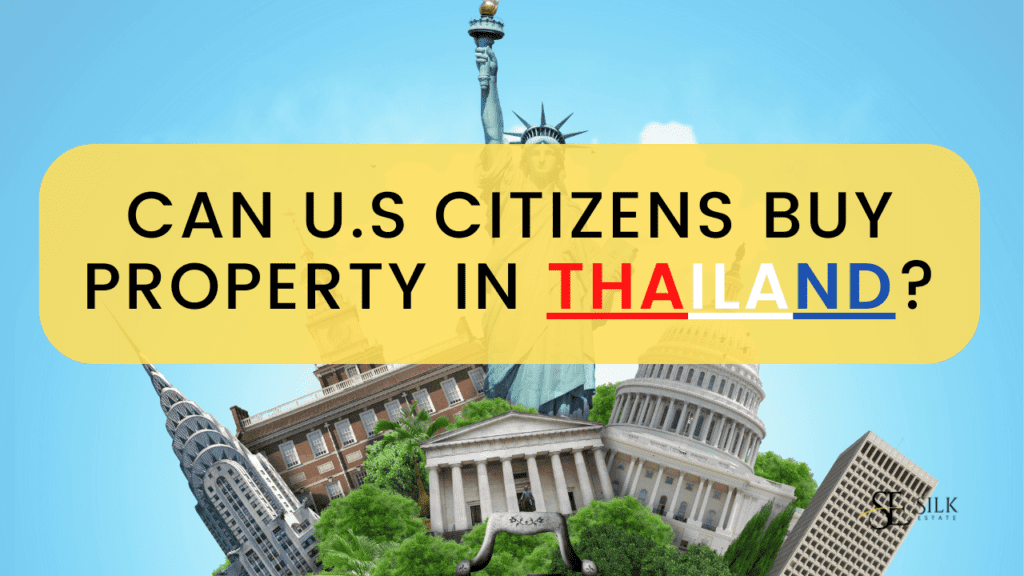Thailand has all the mystiques of paradise those in the ‘real world’ love to experience. Hence, it is common for tourists from the USA to want to move to Thailand or even buy a property in this Thailand. The land of “10,000 smiles.”
Buying property in Thailand as an American or any foreign investor you want to learn as much as you can before you buy a property in Thailand.
This Guide will dive into a little more detail, and if you still have questions after reading you can book a free property consultation with us at Silk Estate.
Can Foreigners Buy Property in Thailand?
Buying property in Thailand as a foreigner is not entirely impossible, although there are some restrictions and regulations on citizens from the US and other foreign countries having property ownership. Indeed, such regulations and restrictions on foreign property ownership vary from country to country, including the United States of America. It is possible for a foreigner to buy property in Thailand though so keep reading to understand what could be involved.
Now, to answer the question, ‘can a U.S citizen buy a property in Thailand?’
The short answer is yes, but there are things related to buying real estate that you need to keep in mind. Keep ready as we discuss how to buy a property in Thailand as a foreigner.
Can a United States Citizen Buy Real Estate Property in Thailand?
Let’s be clear from the start, Americans and other foreigners can not buy land in Thailand; it is prohibited. This also means U.S. foreigners cannot own buildings like houses, townhouses or a villa, as they are considered ‘landed property,’ meaning they touch the land under and around them; hence a foreigner can not own such property in the country.
However, all hope is not lost! Americans, including other foreigners, can still purchase land in Thailand provided they do so through a Thai national and follow any of the following courses of action:
Apply for a long-term land lease of up to 30 years and erect structures on the land, or
Buy condominiums from property developers.
Applying For a Land Lease in Thailand Being a US Citizen
Applying for a land lease in Thailand allows foreigners to maintain a long-term real estate interest in the country, and this also allows you to build structures on the land registered in your name. The good news is that leasing land is relatively cheap and allows you to build your house in the beautiful country of Thailand just the way you want it.
However, ensure the lease details state that a property can be built on the land and permits you to erect residential structures as some leases are only for farming or business purposes.
What is The Maximum Lease On Land You Can Get in Thailand?
The maximum term for a property land leases in Thailand is 30 years; however, a clause can be inserted in the agreement to permit renewal. The land lease renewal has to be done before the lease expires.
Note that the lease does not renew automatically, even if there is a renewal clause in the contract. This is because the renewal clause is not considered a legal right. Both parties have to seek the renewal actively, and even then, it still depends on the land registrar to make the final decision. Application for land lease will be applied for at the land office of the area you looking to buy the property or build property in Thailand.
Is Taking a Land Lease in Thailand Suitable if You?
Well, that depends on many factors such as the purpose of your stay and your long-term intentions whilst being in Thailand.
Here are a few reasons to consider applying for a lease for a property in Thailand for foreign ownership.
You plan to retire in Thailand and build a home for yourself or make a property purchase.
You want to live near a Thai family and decide to lease land from a member of the family.
You want to spend some time in Thailand and desire to stay in your own home?
Need a building for business or farming purposes.
You should read this useful article to learn more about the difference between land title deeds in Thailand.
Buying a Condominium in Thailand as a US Expat
Another option for buying a property in Thailand is to buy a condominium from property developers. There are some important things to note about buying a condominium in Thailand. You will also want to understand what the Thai condominium act is.
Here are they:
You can only buy a condo in Bangkok if there is no more than 49% of foreigners who own a condo in that development. foreigners can not own more than 49% of the total saleable units. This is very important, especially if you are buying a secondhand condo from a Thai citizen. Go to the local condo development association to ensure the foreign ownership quota is not reached.
Also, you can not pay for a condo in Thailand’s local currency. You must pay with foreign currency, meaning you must pay in U.S dollars. The money will be transferred and converted into Baht in Thailand. If the transaction involves sizeable foreign currency, a Foreign Exchange Transaction Form (FETF) must be filled out.
Beware of applicable taxes; they can be pretty substantial. Taxes may be included in some condos’ prices, while taxes are not applicable in some. For instance, if you buy a second-hand condo, the buyer will pay all applicable taxes, which invariably lowers the selling price.
Can a U.S. Citizen Buy a Condo in Bangkok?
Yes, someone from the United State can buy a Condo in Bangkok as long as there is no more than 49% of foreigners already living in the condominium building.
Understanding Property Taxes in Thailand When Buying Real Estate in Thailand
There will be taxes due when you buy property in Thailand as a foreigner. All real estate in Thailand will require you to pay taxes and transfer fees based on the purchase price and property agreement. Let’s take a look at what you could expect when buying a property in Thailand.
Conversely, if you buy a new condo from the developer, the seller only pays the Special Business Tax (SBT), and the rest of the taxes are shared equally. The percentage of the special Business Tax, SBT, depends on how long the seller has owned the condo.
SBT is about 3.3% if the seller has owned the condo for less than 5 years. If the condo is more than five years, the seller pays 0.5% Stamp Duty instead of the SBT.
The value of the property is usually lesser than the selling price so as to provide room for negotiation. Moreover, a 2% Transfer Duty of what the property is worth is paid to the Land Department. Finally, there is the Withholding Tax the buyer usually pays.
The Withholding Tax is like a prepayment of the seller’s income. The rate is usually progressive, based on the appraised value of the unit, and it is taken at the time of transfer.
However, if a Thai company owns the condo, the SBT rate is 3.3% flat regardless of the years of ownership. And the Withholding Tax is 1% flat of either the appraised value or registered selling price, whichever is higher. Quite a lot of tax work, you’d agree.
Hence, you are advised to hire a resident legal practitioner to help with the purchase process; it saves you from violating any of the country’s laws and regulations.
We have established that you can get a condo directly from the developer or buy it second-hand from the owner. A second-hand seller may not necessarily be a citizen, but developers are usually citizens of the country. Both have their advantages and drawbacks.
Let’s look at a few of those:
Buying a Condo in Thailand From a Developer or Pre Condo Owner
Considering all the taxes you must pay, a second-hand purchase is usually more expensive than buying a condo in a new development. Nonetheless, buying a second-hand condo in Thailand means you know and see what you are buying. Buying new can mean a black canvas and you only have drawings to go by on what the final look will be.
When buying from a developer, ensure you buy from the right company, preferably companies that trade on a stock exchange or are well-respected developers in Thailand. New developers can sometimes be naive and neglect government regulations and building requirements, and not complying with these regulations can get you in trouble pretty quickly further down the line with Thai law.
It's recommended to have a lawyer to assist you with any property purchase.
Step 1. Hire a lawyer to help you with the purchase process, as the real estate industry isn’t regulated yet.
Step 2. The lawyer should conduct the necessary due diligence on the property.
Step 3. Once you’ve made an offer which was accepted by the seller, his or her lawyer will draw up the purchase agreement. In this document it should be included who will pay for the legal and transfer fees, as well as taxes — besides the regular conditions of purchase.
Step 4. When signing the contract, you should pay the 10% deposit. Keep in mind that this amount isn’t refundable, except if the seller is the one.
Due diligence should be conducted prior to signing agreements and paying deposits. It is wise to ask the lawyer to do a caveat search and verify the property´s actual condition before engaging in purchase transactions. Once the seller accepts the offer, his lawyer will prepare a purchase agreement. This should include, among other things, which party pays the legal fees, transfer fees, and taxes.
Can a US Person buy a Property In Thailand? Here's Our Conclusion
Under Thailand law, foreigners cannot own land directly in their name. However, U.S citizens can buy property in Thailand! They can purchase condominiums outright ‘Freehold’ or buy a landed property and lease the ground usually for 30 years, with the option to extend. There are also options for using a Thai Limited Company and do speak to a lawyer before embarking on this investment.
While U.S. citizens are prohibited from buying land in Thailand, a U.S person can, however, apply for a long-term 30-year lease and then have the option to build real estate on the leased land. As a U.S citizen, you can also buy condominiums from property developers. You can only buy a condo in a development that has less than 49% of them owned by foreigners.
YES, a U.S citizen can buy a property in Thailand!
Buying property in Thailand can still be a tricky area and we advise you to speak to a professional about your own situation. We hope the areas discussed in this article will help you in making informed decisions whenever you decide to buy a property in Thailand. Make sure to drop us a message and schedule a property consultation call.
You may be interested in this post >>> American Expats Moving & Living Abroad In Thailand
You may be interested in this post >>> Things To Keep In Mind While You Buy A Condo in Bangkok.




